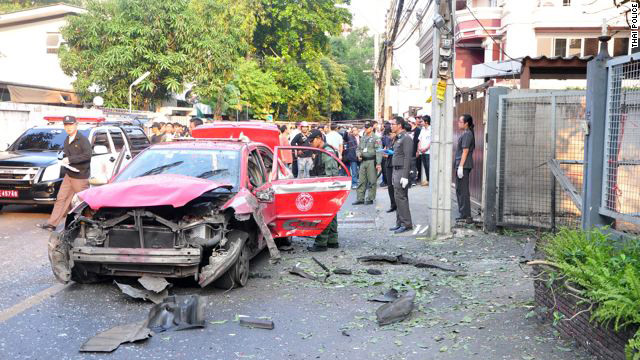
Masoud Sedaghatzadeh is
wanted by the Thai authorities for his alleged involvement in the
Bangkok blasts along with several other Iranians.
It is not yet clear when
Sedaghatzadeh will be extradited, as he plans to file an application to a
higher court in Malaysia, seeking his release from prison.
The explosions in Bangkok
did not cause any deaths, but the Thai authorities have said they were
intended for Israeli diplomats. The devices used explosive materials
that are not available in Thailand and were most likely smuggled in, the
police have said.
The Bangkok blasts came a
day after a device attached to an Israeli Embassy van in New Delhi
exploded, and another device, found on an embassy car in Tbilisi, the
capital of Georgia, was safety detonated.
Israeli officials blamed Iran for the attacks, but Tehran has denied the accusations.
On Monday, the Malaysian
judge, Justice S.M Komathy Suppiah, ruled that Sedaghatzadeh be remanded
in prison for as many as 15 days, pending an extradition order from the
Minister of Home Affairs.
"In my view, the conduct
of the respondent is inconsistent with that of an innocent man," she
said, referring to Sedaghatzadeh. "I'm allowing the application for
extradition and the respondent is to be detained in prison pending an
order from the minister for his render."
The Malaysian prosecutor,
Kamal Baharin Omar, said Sedaghatzadeh, 31, was arrested at Kuala
Lumpur airport on February 15, a day after one of the bombs went off at a
house in Bangkok.
Mr. Kamal said the Thai
police had CCTV footage showing Sedaghatzadeh entering and leaving the
house where the explosives were detonated.
He questioned why Sedaghatzadeh would leave the house and flee to Kuala Lumpur if he was not connected to the explosives.
"All the actions subsequent to the explosion do not show the innocence of the respondent," he said.
Sedaghatzadeh's lawyer,
Mohamad Nashir Hussin, argued that the Thai police had not been able to
show that the respondent was involved in the incident.
"There's no evidence that the respondent had any contact or had even seen the explosives in the house," he said.
Sedaghatzadeh, who was
handcuffed and dressed in a polo shirt and jeans, told the court that he
would file a habeas corpus, an application asking to be released from
prison.
"I require more time to defend myself," he said through a translator.
The Thai authorities
have detained two Iranian suspects in the case: Saeid Moradi, 28, whose
legs were blown off by his own bomb; and Mohammad Khazaei, 42, who was
taken into custody at Bangkok's Suvarnabhumi Airport as he tried to
board a plane to Malaysia. Both are being held at a Bangkok prison until
their next court appearance.
They and Sedaghatzadeh
face charges that include joint assembly of explosive devices, joint
possession of explosive devices without permits and causing an explosion
injuring other persons. Moradi also faces charges of attempted killing
of state officials on duty and the intentional attempted killing of
other persons.
Two other suspects in
the case are still at large, according to Gen. Pansiri Prapawat, the
deputy national police chief who is heading the investigation into the
bombings.
They are Nikkahfard Javad, a 52-year-old Iranian man, and Rohani Leila, an Iranian woman.
Thailand has issued an arrest warrant for the suspects and sent their names to Interpol's wanted list, Pansiri said.
Tidak ada komentar:
Posting Komentar